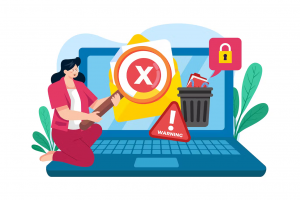Scammers are constantly coming up with new ways to trick people into giving up their money or personal information. But behind clever stories and fake websites, they often use the same old persuasion techniques to manipulate their victims. In this blog post, we will explore some of the most common phishing and scamming techniques and how to avoid them with Phish Alerts, a Chrome extension that helps you report and block phishing emails in Gmail with one click.
Here are some of the scamming techniques and how to avoid them:
-
Spoofing:
Spoofing is a technique where scammers create fake websites, emails, phone numbers, or social media accounts that look identical to the real ones. They use these to impersonate legitimate organizations or individuals and lure victims into providing sensitive information or making payments. For example, they may send an email that looks like it comes from your bank, asking you to verify your account details or update your security settings.

How to avoid: Always check the source and validity of any message or website that asks you to take action or provide information. Look for signs of spoofing, such as spelling errors, mismatched domains, or unusual requests. If you are not sure, contact the organization or person directly using their official website or phone number. You can also use the Phish Alert Chrome extension to report and block any suspicious email in Gmail with one click. This will help you avoid spoofing scams and protect your data.
-
Smishing:
Smishing is a form of phishing where scammers send text messages to victims, pretending to be someone they trust or offering something they want. They use these messages to entice victims to click on a link, call a number, or reply with personal information. The link may lead to a malicious website that downloads malware or steals data, the number may charge high fees or connect to a fraudster, and the reply may reveal sensitive information.

How to avoid: Don’t trust any text message that asks you to take action or provide information. Be wary of messages that create a sense of urgency, offer too-good-to-be-true deals, or use emotional triggers. Delete any suspicious messages and block the sender. Using updated databases and smart tech patterns, you can also use the Phish Alert Website Blocker (PAWB) to protect yourself from phishing websites. This will help you avoid smishing scams and malware infections.
-
Voice cloning:
Voice cloning is a technique where scammers use artificial intelligence to imitate the voice or appearance of someone the victim knows or trusts, based on their social media data or other sources. They use these to make phone calls or video calls to victims, pretending to be their friends, family members, colleagues, or authorities. They use these calls to ask for money, personal information, or Favors.

How to avoid: Don’t trust any phone call or video call that asks you to take action or provide information. Be alert for signs of voice cloning, such as background noise, delays, glitches, or unusual requests. If you are not sure, ask questions that only the real person would know, or hang up and contact them using another method. You can also use the Phish Alert Caller ID (PACI) to identify and block any spoofed phone numbers. This will help you avoid voice-cloning scams and identity theft.
-
Charity scams:
Charity scams are scams where scammers pretend to be representatives of genuine charities or create fake charities to solicit donations from victims. They often exploit natural disasters, humanitarian crises, or other events that generate sympathy and generosity from the public. They use various channels, such as emails, phone calls, social media posts, or websites, to reach out to potential donors and ask for money.

How to avoid: Don’t donate to any charity that you are not familiar with or that contacts you unsolicited. Research before giving money to any charity, and check their credentials and reputation. Use secure and traceable payment methods, and avoid giving cash, gift cards, wire transfers, or cryptocurrencies. You can also use the Phish Alert Charity Checker (PACC) to verify the legitimacy and transparency of any charity. This will help you avoid charity scams and fraud.
-
Romance scams:
Romance scams are scams where scammers create fake profiles on dating sites or social media platforms and establish romantic relationships with victims. They often use stolen photos and identities of real people or create attractive personas that match the victims’ preferences. They use these relationships to gain the victims’ trust and affection and then ask for money, gifts, or personal information.
How to avoid: Don’t fall in love with someone you have never met in person or verified their identity. Be cautious of anyone who professes their love too quickly, asks for money or Favors, or avoids video calls or meetings. If you suspect a romance scam, stop all contact and report it to the platform and authorities. You can also use the Phish Alert Romance Scam Detector (PARSD) to check the authenticity and background of any online date. This will help you avoid romance scams and heartbreak.
What Is Phishing?
Phishing is a type of cyber-attack that aims to steal your sensitive data, such as your login credentials, bank account details, or personal information. Phishing attackers pretend to be someone you trust, such as your bank, your email provider, or your social media platform, and send you fraudulent messages or emails that look legitimate. They try to trick you into clicking on a malicious link, opening a harmful attachment, or providing your information on a fake website.
Phishing got its name from “phish” meaning fish. It’s a common phenomenon to put bait for the fish to get trapped. Similarly, phishing works. It is an unethical way to dupe the user or victim to click on harmful sites. The attacker crafts the harmful site in such a way that the victim feels it to be an authentic site, thus falling prey to it.

How can you protect yourself from phishing attacks?
Here are some tips:
- Be careful of any message or email that asks you to take action or provide information. Always check the source and validity of the sender and the message. Look for signs of spoofing, such as spelling errors, mismatched domains, or unusual requests.
- Don’t click on any link or open any attachment that you are not expecting or that looks suspicious. Please hover over the link to see where it leads before clicking on it. Scan any attachment with antivirus software before opening it.
- Don’t provide any information on any website that you are not sure of. Check the URL and the security certificate of the website before entering any data. Look for the padlock icon and the “https” prefix in the address bar.
- Use the Phish Alert to report and block phishing emails in Gmail with one click. Phish Alerts also protects you from phishing websites by using updated databases and smart tech patterns.
Phishing is one of the most common and dangerous types of scams that use these techniques to lure us into clicking on malicious links or attachments in emails or messages. Phishing can lead to identity theft, financial loss, malware infection, ransomware attack, and more.
That’s why we created Phish Alert, a Chrome extension that helps you report and block phishing emails in Gmail with one click. Phish Alerts also protects you from phishing websites by using updated databases and smart tech patterns.
Defend Against Scammers: Stay Ahead with Phish Alerts and Protect Your Personal Information
Protect yourself from scammers who are constantly devising new ways to manipulate individuals and obtain sensitive information or money. Introducing Phish Alerts, a comprehensive website dedicated to helping you avoid scamming and fraudulent activities. Learn how scammers employ phishing techniques, such as fake emails and messages, to deceive victims. Discover how Phish Alerts offers a powerful Chrome extension to report and block phishing emails in Gmail with just one click. Stay safeguarded from phishing websites through their updated databases and smart tech patterns. Additionally, educate yourself on recognizing and avoiding scamming through Phish Alerts’ online courses and webinars. Enhance your scamming awareness and secure your protection with Phish Alerts – your ultimate guide to outsmarting scammers.
Don’t fall victim to phishing scams. Download Phish Alerts Chrome Extension today and stay safe online.

